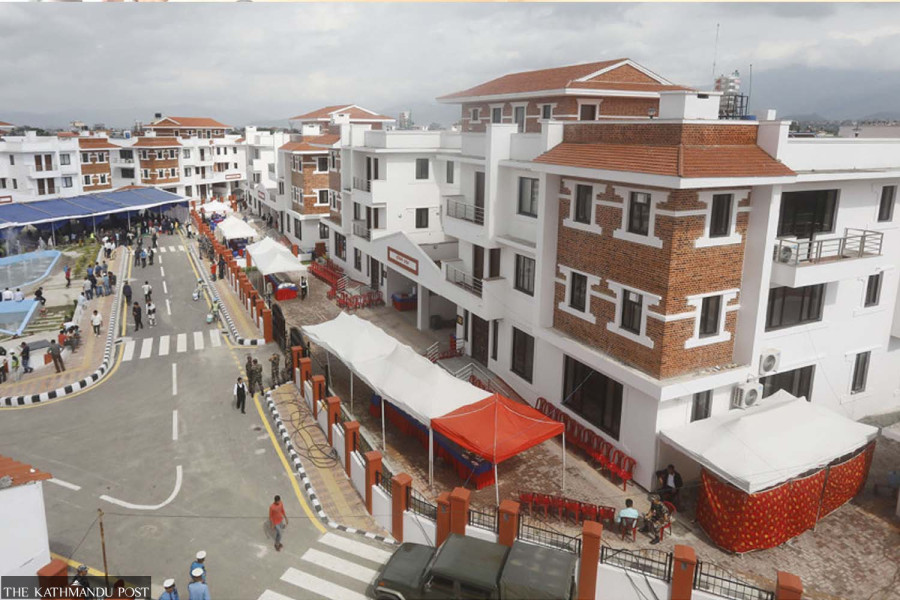National
Do provincial officials really need lavish abodes in the federal capital?
Earlier this week, the prime minister unveiled seven buildings for chief ministers and province heads in Lalitpur.
Tika R Pradhan
The federal government, which is often criticised for its reluctance to delegate constitutional powers to provincial governments, has constructed seven attractive buildings with 14 blocks for the chief ministers and province heads at Bhainsepati in Lalitpur.
The apartment blocks were constructed as per the federal government’s plan to set up both a contact office and residences for all chief ministers and province heads. The decision, according to the government, is expected to improve coordination between the provinces and Kathmandu.
Prime Minister Pushpa Kamal Dahal inaugurated the buildings on Sunday and their keys were handed over to the authorities concerned. The housing project’s construction was started five years ago when KP Sharma Oli was the prime minister. The project, which sprawls over 1.41 hectares, was completed at a cost of Rs850 million. Each building features a water fountain, a garden and a ground water boring plant, among others.
Though some observers say it is good to have residencies for top provincial officials in Kathmandu, many leaders and politicians see it as a “reverse path” for federalism as it could further shift the loyalty of the provinces to the federal government.
Provincial governments are struggling to find places to build residential quarters for their chief ministers, ministers, speakers, deputy speakers and provincial chiefs.
“I had asked for land to build quarters for chief ministers and ministers when I was chief minister, but to no avail,” said Prithvi Subba Gurung, former chief minister of Gandaki Province. “The problem is with the intent of the federal government, one that is not helping the provinces construct such buildings in the respective provinces.”
Gurung, however, said it was good for the government to provide residences for the chief ministers and provincial chiefs as they need to visit the federal capital often and it is not always easy to stay at hotels or rented apartments.
However, experts on federalism say providing ‘lavish’ residences to provincial officials at a time when people of the provinces are struggling with rising cost of living reflects poorly on the federal government.
“Permanent residences for the officials should be constructed in their respective provinces, not in the federal capital where these officials visit only occasionally,” said Rudra Sharma, a federalism expert. “The housing project goes against the spirit of federalism. Instead of working to strengthen federalism, both the provincial and federal governments appear to be taking a reverse path.”
So far, the federal government has been renting apartments for the provincial chiefs and chief ministers at Dhapakhel paying Rs55,000 a month per apartment.
Senior Advocate Chandra Kanta Gyawali, an expert on federalism, said the federal government should have built such houses in the respective provinces, although some kind of residential arrangement for the officials was needed in the federal capital as well.
“This shows the centralised mentality of the leaders in the federal government,” Gyawali told the Post. “Actually, the federal government seems intent on rolling back federalism as nothing is being done for the development of the provinces.”
Gyawali said for the leaders in the federal parliament, both in the government and opposition, federalism is nothing but a hollow rhetoric they keep repeating without any commitment to its ethos.
Having such buildings in the federal capital, according to Gyawali, is akin to asking them to continue living in the Capital.
But in the words of former chief minister Gurung, it doesn’t mean that the construction of such buildings is not worth it just because no such buildings were constructed in the provinces where they were needed the most.
“The issue is that such buildings are necessary in both places,” Gurung told the Post.
However, some politicians argue that given the fund crunch for the development projects in provinces, it was not wise for the federal government to spend such a huge amount of money on lavish buildings for provincial officials.




 22.96°C Kathmandu
22.96°C Kathmandu














